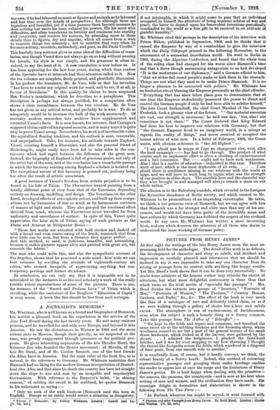A JOURNALIST'S MEMORIES.* Ma. WHITMAN, who is well known as
a friend and biographer of Bismarck, has written a pleasant book on his experiences in the service of the .New York Herald during the last twenty years. He met many eminent persons, and he travelled far and wide over Europe, and beyond it into Aniorica. He saw the disturbances in Warsaw in 1905 and the more serious riots in Moscow, though their gravity, as we suspected at the time, was grossly exaggerated through ignorance or for political pur- poses. He gives interesting impressions of the late Theodor Herzl, the Viennese Jow who founded the Zionist movement ; of Blowitz, of the late Mr. Stead, and of Mr. Gordon Bennett, one of the best friends the Allies have in America. But the main value of the book lies, as is natural, in the references to Germany. Mr. Whitman maintains that Bismarck bad no liking for the modern German interpretation of Deutsch- land fiber Allen, and that since his death the country has been led straight clown the slope to war and ruin by an incapable and unprincipled Government. With reference to the Emperor's habit, " in shining armour," of rattling the sword in his scabbard, he quotes Bismarck i in his retirement as saying :—
" Only no cook of the walk business (Bismarck used this term in `English). Europe as an entity would resent a situation as derogatory,
• Things I Renumber. By fildnOY Win. Leaden: Luna and Cs, L7e. Bd. net.[ if not intolerable, in which it might come to pass that an individual arrogated to himself the attribute of being supremo arbiter of war and peace, the latter to depend upon his benevolent intentions periodically vouchsafed to the world as a free gift to be received in an attitude of grateful humility!'
Mr. Whitman cited this passage in the description of his interview with Prince Billow, published in September, 1908, and he thinks that it caused the Emperor by way of a counterblast to give the interview
which the Daily Telegraph printed in the following November, to the amarement of a somewhat immediate= world. He went to Berlin in 1906, during the Algeciras Conferdnce, and found that tho whole tone
of the ruling class had changed for the worse since Bismarck's time and that a fierce though unreasoning antagonism to us had developed "It is the misfortune of our diplomacy," said a German official to him, "that we either fall round people's nacks or kick them in the stomach.
Things are not what they used to be under Prince Bismarck. It is no longer a pleasure to be connected with politics." Mr. Whitman has no hesitation about blaming the Emperor personally as the chief offender. " Everything that has since taken place goes to demonstrate that at one time the Emperor undoubtedly possessed the power to direct and control the German people if only he had been able to subdue himself."
The late Count Seckendorff, the chief Court Marshal of the Empress Frederick, took a gloomy view of the future. " ` Our material resources are vast, our strength is enormous,' he said one day, ` but, alas ! our conscience is not clean.' " The Count declared that King Edward had done his best to improve our relations with Germany, but that " the German Emperor lived in an imaginary world, in a mirage as regards the reality of things," and never received or accepted the honest advice of wise men. In a letter of February, 1908, the Count wrote, with obvious reference to " the AM-Highest "
"I am afraid qua le temps et rtlge ne ohangeront rien, even after the hard campaign = has had to go through. The product of what creates such an unpleasant effect is often a cloaking of embarrassment and a bad conscience. But — ought not to have such weaknesses. Alas I that is a matter of education—unfinished in this case. Therefore want of tact, which is the most deplorable of all evils. . . . I am afraid there is confidence missing in our relations with the world at large, and we will have to work long to regain what was the strength of our position in olden days. The scandals here slid the shameful way they wore brought in and managed will always remain a stain on our whole nation."
The allusion is to the Eulenberg-scandals, which revealed to the foreigner the Byzantine decadence of Berlin society, and which seemed to Mr. Whitman to be premonitions of an impending catastrophe. He takes, we think, a too generous view of Bismarck, but we can agree with him that Bismarck was a far stronger and abler man than any of his suc- cessors, and would not have been guilty of the incredibly mean and base actions by which Germany has forfeited the respect of the civilized world. In any case, Mr. Whitman has written a most interesting book, and one which &serves the attention of all those who desire to understand the inner working of German policy.














































 Previous page
Previous page